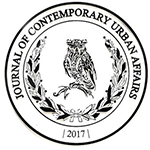Why isn’t urban development sustainable?
An institutional approach to the case of Athens, Greece
DOI:
https://doi.org/10.25034/ijcua.2020.v4n1-7Keywords:
Sustainable Development, Historical Institutionalism, Path-dependency, Urban Policies, AthensAbstract
Despite the rise to prominence of sustainable planning, the state of urgency and the pressure imposed by the extreme competition between metropolitan territories reduce sustainability to a market-oriented doctrine for deregulated urban development. The aim of this article is an exploration of the current Athenian urban crisis, by centring on sustainable urban development plans, territorial planning institutions, and urban policies. To this end, the phenomenon of urban crisis is explained as a derivative of the failure of sustainability reforms. By establishing a link between the institutional framework governing urban development and the success or failure of sustainability reforms, this article seeks to contribute to the discussion around the attainability, scope and impact of sustainable urban development plans. Through the hypothesis that as long as territorial planning is used as means towards speculative urban development, it will only be equivalent to that of a real estate facilitating mechanism, it is argued that the urban development model of Athens, as well as the role that institutions have in its shaping, is incompatible with any notion of sustainability. The main contribution of this article is to potentially help towards developing a critical reflection on how projects, plans, territories and sustainability should be approached.
Downloads
References
Ascher, F. (1995). Métapolis: ou l'avenir dês villes [Metapolis or the future of cities]. Odile Jacob.
Bijker, W. E., Hughes, T. P., & Pinch, T. J. (Eds.). (1987). Society in the making: the study of technology as a tool for sociological analysis. The social construction of technological systems. The MIT Press.
Burgel, G. (1976). Αθήνα, Η Ανάπτυξη μιας Μεσογειακής Πρωτεύουσας [Athens, The Development of a Mediterranean Capital]. Exantas.
Burgel, G. (2002). Le miracle athénien au XXe siècle [The Athenian Miracle in the 20th Century]. CNRS Éditions via OpenEdition https://doi.org/10.4000 / books.editionscnrs.40174
Chorianopoulos, I., Pagonis, T., Koukoulas, S., & Drymoniti, S. (2010). Planning, competitiveness and sprawl in the Mediterranean city: The case of Athens. Cities, 27(4), 249-259. https:/doi.org/10.1016/j.cities.2009.12.011
Cluzet, A. (2010). Ville libérale ou ville durable?: répondre à l'urgence environnementale [Liberal City or Sustainable City? Responding to the Environmental Urgency]. L'Harmattan.
Connolly, J. J. T. (2018). From Systems Thinking to Systemic Action: Social Vulnerability and the Institutional Challenge of Urban Resilience. City & Community, 17(1), 8-11. https://doi.org/10.1111/cico.12282
Davis, M. (2006). Planet of slums. Verso. https://doi.org/10.1111/j.1540-5842.2006.00797.x
Dawson, A. (2019). Extreme Cities: The Peril and Promise of Urban Life in the Age of Climate Change. Verso.
Dolowitz, D., & Marsh, D. (1996). Who Learns What from Whom: A Review of the Policy Transfer Literature. Political Studies, 44(2), 343-357. https://doi.org/10.1111/j.1467-9248.1996.tb00334.x
Dolowitz, D. P., & Marsh, D. (2000). Learning from abroad: The role of policy transfer in contemporary policy‐making. Governance, 13(1), 5-23. https://doi.org/10.1111/0952-1895.00121
Doxiadis, C. A. (1968). Ecumenopolis: Tomorrow’s city. Britannica book of the year, 26-30. https://www.doxiadis.org/Downloads/ecumenopolis%20tommorow's%20city.pdf
Dragonas, P. (Ed.). (2011). In Greeklish: Στοιχεία καταγωγής της νεώτερης αρχιτεκτονικής στην Ελλάδα [In Greeklish: The Origin of Modern Architecture in Greece]. Θέματα Χώρου + Τεχνών [Design + Art in Greece].
Easterling, K. (2014). Extrastatecraft: The power of infrastructure space. Verso Books.
Economou, D., Getimis, P., Demathas, Z., Petrakos, G., & Pyrgiotis, Y. (2001). Ο Διεθνής Ρόλος της Αθήνας [The International Role of Athens]. University of Thessaly Press.
Emmanuel, D. (1995). On the structure of housing accumulation and the role of family wealth transfers in the Greek housing system. In Housing and Family Wealth: Comparative International Perspective. London: Routledge.
GIANNAKOUROU, G. (2003). The implementation of EU environmental policy in Greece. In D. G. Dimitrakopoulos & A. G. Passas (Eds.), Greece in the European Union (pp. 51-60). Routledge https://doi.org/10.4324/9780203489048
Government Gazette. (1929a). Γενικός Οικοδομικός Κανονισμός - ΦΕΚ 155/Α/22-04-1929 [State Construction Code - 155/Α/22-04-1929]. http://bit.do/e3sJ8
Government Gazette. (1929b). Περί της Ιδιοκτησίας κατ' Ορόφους - ΦΕΚ 4/Α/09-01-1929, Νόμος 3741/1929 [On Property Ownership of Storeys - GGI 4/Α/09-01-1929, Law 3741/1929]. http://bit.do/e3sJP
Government Gazzette. (2013). Αντιμετώπιση της Αυθαίρετης Δόμησης - ΦΕΚ 174/Α/08-08-2013, Νόμος 4178/2013 [Measures Against Illegal Constructions - GGI 174/Α/08-08-2013, Law 4178/2013]. http://bit.do/e3sKm
Government Gazzette. (2014). Νέο Ρυθμιστικό Σχέδιο Αθήνας Αττικής - ΦΕΚ 156/Α/01-08-2014, Νόμος 4277/2014 [New Regulatory Plan of Athens-Attica - GGI 156/Α/01-08-2014, Law 4277/2014]. http://bit.do/e3sKy
Graham, S., & Marvin, S. (2001). Splintering urbanism: networked infrastructures, technological mobilities and the urban condition. Routledge.
Gunder, M. (2010). Planning as the ideology of (neoliberal) space. Planning Theory, 9(4), 298-314. https://doi.org/10.1177/1473095210368878
Hansen, T., & Coenen, L. (2015). The geography of sustainability transitions: Review, synthesis and reflections on an emergent research field. Environmental Innovation and Societal Transitions, 17, 92-109. https:/doi.org/10.1016/j.eist.2014.11.001
Heidenreich, E., Chtouros, S., & Detlev, I. (2007). Αθήνα: Η Κοινωνική Δημιουργία μιας Μεσογειακής Μητρόπολης [Athens: The Social Creation of a Mediterranean Metropolis]. Kritiki.
Karidis, D. N. (2008). Τα Επτά Βιβλία της Πολεοδομίας [The Seven Books of Urban Planning]. Papasotiriou.
Karidis, D. N. (2015). Athens from 1920 to 1940
A true and just account of how History was enveloped by a modern City and the Place became an Event. Archaeopress. https://doi.org/10.2307/j.ctvxw3ncg
Karvonen, A. (2011). Politics of urban runoff: nature, technology, and the sustainable city. MIT Press. https://doi.org/10.7551/mitpress/8953.001.0001
Koolhaas, R. (2014). My thoughts on the smart city. In European Commission (Ed.), Digital Minds for a New Europe.
Lefebvre, H. (1996). Writings on cities. Blackwell Publishing.
Leo Van Den Berg, Erik Braun, & Jan Van Der Meer (Eds.). (2016). National urban policy in Greece. Routledge.
Leontidou, L. (1990). The Mediterranean city in transition: Social change and urban development. Cambridge University Press. https://doi.org/10.1017/CBO9780511522208
Moran, M. (2010). Policy-making in an interdependent world. In C. Hay (Ed.), New Directions in Political Science: Responding to the Challenges of an Interdependent World (pp. 25-42). Red Globe Press.
OECD. (2009). OECD Environmental Performance Reviews: Greece OECD. https://doi.org/10.1787/9789264061330-en
Paschou, A. (2008). Urban block in post-war Athens: development, form and social context. 38-42. https://doi.org/10.3929/ethz-a-005810305
Peters, B. G. (1996). Political institutions, old and new. In A new handbook of political science (pp. 205-220). Oxford University Press https://doi.org/10.1093/0198294719.003.0007
Petropoulou, C. (2011). Développement urbain et éco-paysages urbains: une étude sur les quartiers de Mexico et d'Athènes d'Athènes [Urban Development and Urban Eco-Landscapes: A Study of the Neighbourhoods of Mexico and Athens]. L'Harmattan.
Prévélakis, G. (2000). Athènes: urbanisme, culture et politique [Athens: Urbanism, Culture and Politics]. L'Harmattan.
Rodrigue, J.-P., Comtois, C., & Slack, B. (2013). The geography of transport systems. Routledge. https://doi.org/10.4324/9780203371183
Published
How to Cite
Issue
Section
License
Copyright (c) 2020 Journal of Contemporary Urban Affairs

This work is licensed under a Creative Commons Attribution-NonCommercial-NoDerivatives 4.0 International License.

















